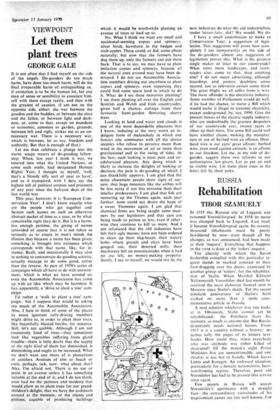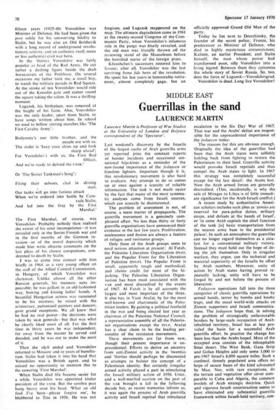RUSSIA
Rehabilitation
TIBOR SZAMUELY
In 1935 the Russian city of Lugansk was renamed Voroshilovgrad. In 1958 its name was changed back to Lugansk. Last week it became Voroshilovgrad again. Its seventy thousand inhabitants must be pretty bewildered by now—even though all the changes, as was announced, had been made at their 'request'. Everything that happens in the USSR is done at the 'toilers' request.
The alacrity with which the Soviet leadership complied with this particular re- quest stands in marked contrast to their foot-dragging over the desire, expressed by another group of 'toilers', for the rehabilita- tion of Stalin. When Marshal Kliment Yefremovich Voroshilov died last month he received the most elaborate funeral seen in Moscow since Stalin's death. Yet the recent ninetieth anniversary of Stalin's birth evoked no more than a snide com- memorative article in Pravda.
A neat solution whichever way one looks at it. Obviously, Stalin cannot yet be rehabilitated : the Politburo fears his memory, as much as anyone else. But Russia desperately needs national heroes. From 1917 it is a country without a history: no names sully the pages of its history text- books. How could they, when everybody who was anybody was either killed or disgraced? Of the nation's eight Prime Ministers five are unmentionable, and one (Stalin) is too hot to handle. Which leaves Lenin and Kosygin. An awkward situation, particularly for a fiercely nationalistic, hero- worshipping regime. Therefore poor old Voroshilov has had to be pressed into service once again.
Few people in Russia will accept Voroshilov's apotheosis with a straight face—the extraordinary vicissitudes of his tragicomical career are too well known. For fifteen years (1925-40) Voroshilov was Minister of Defence. He had been given the post solely for his unswerving fidelity to Stalin, but he was also an Old Bolshevik with a long record of underground revolu- tionary activity, and an authentic (well, more or less authentic) civil war hero.
In the 'thirties Voroshilov was fairly popular as head of the Red Army. He cut rather a dashing figure beside the drab bureaucrats of the Politburo. On several occasions my father took me, a small boy, to watch the military parade in Red Square. At the stroke of ten Voroshilov would ride out of the Kremlin gate and canter round the square taking the salute. It was a thrilling moment.
Lugansk, his birthplace, was renamed at the height of his fame. Also, Voroshilov was the only leader, apart from Stalin, to have songs written about him. In school we used to bellow stirring marches like 'The First Cavalry Army': Budyonny's our little brother, and the people are with us, The order is 'keep your chins up and look sharp ahead'; For Voroshilov's with us, the First Red Officer, And we're ready to defend the USSR.'
Or 'The Soviet Tankmen's Song': Firing their salvoes, clad in shining steel, Our tanks will go into furious attack When we're ordered into battle by Com- rade Stalin, And led into the fray by the First Marshal.'
The First Marshal, of course, was Voroshilov. Probably nobody then realised the extent of his utter incompetence—it was revealed only in the Soviet-Finnish war and in the first months of the German in- vasion—or of the moral depravity which made him write obscene comments on the last pleas of his closest companions, con- demned to death by Stalin.
I was to come into contact with him briefly in 1964, as a very young officer on the staff of the Allied Control Commission, in Hungary, of which Voroshilov was chairman. Unlike almost all the other Russian generals, his manners were im- peccable; he was gallant in an old-fashioned way, bowing and kissing ladies' hands. A beautiful Hungarian actress was rumoured to be his mistress; he mixed with the aristocracy, patronised painters and dancers, gave grand receptions. We all knew that he had no real power—the decisions were taken by MGR generals—but that was what he clearly liked most of all. For the first time in thirty years he was independent, far away from the master he served and dreaded, and he was out to make the most of it.
Then the idyll ended and Voroshilov returned to Moscow and to years of humilia- tion. Stalin had taken it into his head that Voroshilov was a British agent, and he missed no opportunity to mention this to the cowering 'First Marshal'.
When Stalin died life became easier for a while. Voroshilov was appointed titular president of the Lissa. But the sombre past hung heavy over his head. 'What an old fool I've been—please forgive me', he blubbered to Tito in 1956. He was not forgiven, and Lugansk reappeared on the map. The ultimate degradation came in 1961 at the twenty-second Congress of the Com- munist Party, when Voroshilov's infamous role in the purge was finally revealed, and the old man was literally thrown off the reviewing stand of the Mausoleum before the horrified stares of the foreign press.
Khrushchev's successors restored him to favour; after all, Voroshilov was the last surviving bona fide hero of the revolution. He spent his last years in honourable retire- ment, almost completely gaga, but an
officially approved Grand Old Man of the party.
Today he lies next to Dzerzhinsky, the founder of the secret police; Frunze, his predecessor as Minister of Defence, who died in highly mysterious circumstances; Kalinin, an earlier President; and Stalin himself, the man whose power had transformed poor, silly Voroshilov into a living legend. Between them they epitomise the whole story of Soviet Russia. So, too, does the farce of Lugansk—Voroshilovgrad.
Voroshilov is dead. Long live Voroshilov I



































 Previous page
Previous page